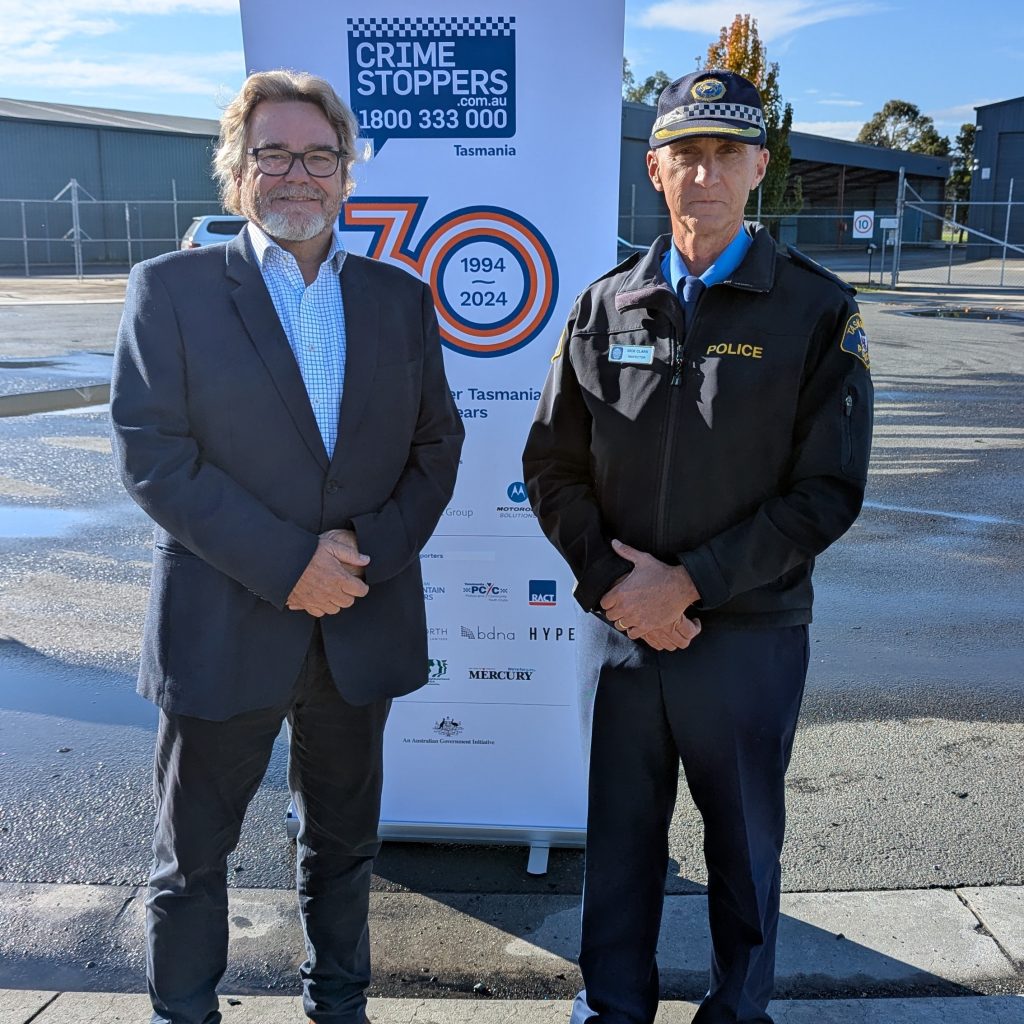Crime Stoppers Calls for Action on Dangerous Driving.
With 20% of Crime Stoppers Tasmania’s tips relating to traffic and hooning, Crime Stoppers is reminding Tasmanians that their anonymous tips can help make our roads safer.
Crime Stoppers Tasmania Ambassador Mr Mark Mewis is urging Tasmanians to provide more detailed information to ensure their tips make an impact and get dangerous drivers off our roads.
Crime Stoppers has received over 500 tips relating to traffic and hooning offences in the first four months of this year, with 122 of these tips from Northern Tasmania. Unfortunately, many of these tips don’t contain enough information to assist police investigations. Dangerous driving reaches all corners of our state – it is not limited to our busy cities, but extends to our regional communities, with an example being the recent hooning incident on Bruny Island.
“It is clear – our community wants our roads to be safer, and we want to support them with knowing what information helps investigations and follow up,” Mr Mewis said.
“We’re calling out hooning of any type as being unacceptable behaviour in our neighbourhoods, in our towns and in our cities and that’s whether it’s in a suburban street or park, on our main streets or in industrial areas such as where we are today, where clearly, we can see there has been illegal activity.
“The risk to people’s safety is very real, and the potential damage to property cannot be underestimated.”
The tips that Crime Stoppers receives range from people driving unlicensed or unregistered vehicles; people who regularly drive while under the influence of alcohol or drugs; and unsafe driving which could put others at danger, such as speeding, hooning or burnouts.
“We need tips to contain as much detail as possible. We would rather receive too much detail than not enough”, Mr Mewis added.
Information such the vehicle registration, make, model, and colour; street, suburb, time and date; what the driver was doing, the number of vehicles and people involved, and names if you know them. If you know that it is a regular and ongoing issue, that is also valuable information.
When it is safe to do so, photos and videos can add great value to a tip. If you aren’t driving – either as a passenger or passer-by, you are often in a better position to take photos or video instead of the driver having to pull over to the roadside.
Mr Mewis added, “photos and video can be uploaded with your tip onto the Crime Stoppers Tasmania website – and you can still safely remain anonymous.”
Mr Mewis thanked the community for their information and the impact this has had in helping to prevent crime in Tasmania.
“Every tip is followed up, but it’s the ones that contain the best information that can result in a positive outcome for everyone. We have had some great information passed onto us from the community, many that has led to arrests and charges. Community tips really do make a difference” stated Mr Mewis.
- One video tip submitted via the Crime Stoppers Tasmania Make a Tip portal, captured a vehicle hooning. The footage clearly showed the driver and the vehicles registration, allowing Crime Stoppers Tasmania to pass this onto to Tasmania police to act. The result meant that the offender was able to be identified and charged.
- Another tip identified a suspected drink driver, with the details about their name, vehicle registration, when and where they usually were out and about driving under the influence. The incredible detail of this tip meant Tasmania Police were able to find the offender drink driving and lay charges.
“Remember if you see something, please speak up. We don’t need to know who you are, just what you know”, Mr Mewis said.
Supporting Crime Stoppers, Inspector Nick Clark said dangerous driving behaviour, including hooning, was a priority for Tasmania Police.
“While most road users respect each other and themselves enough to stick to the road rules, there are some who continue to commit offences on our roads,” Inspector Clark said.
“Hooning is not only illegal, it’s also dangerous, annoying, and puts people’s lives at risk.
“We will not tolerate this kind of behaviour.”

Pictured: Crime Stoppers Tasmania Ambassador Mr Mark Mewis & Tasmania Police Inspector Mr Nick Clark.
If you see illegal, unlawful or suspicious behaviour, please report it to police at the time by calling 131 444. In an emergency call triple zero (000).
Information about crime can also be provided anonymously to Crime Stoppers Tasmania at crimestopperstas.com.au or on 1800 333 000.
